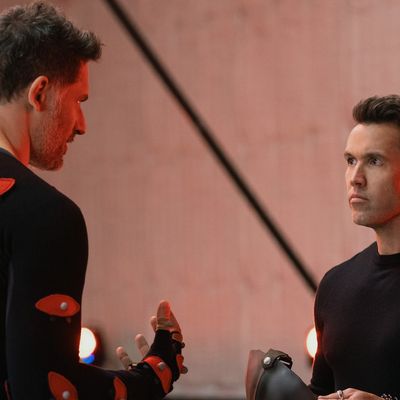
Since the first appearance of the art department in season two, I’ve always craved a more in-depth look at how they function. For two seasons now, the team has been established as perennially overlooked and underappreciated, possibly the most exploited department at the company. There’s a lot of potential to the idea of exploring their efforts to get credit for all they do — or even making peace with staying at a job where they know they never will get that credit.
“The Year of Phil” is ostensibly that episode, judging by the title. It’s when Phil’s rage finally boils over and he goes on an all-out assault against the company. And it ties in neatly with Carol’s storyline, which has been missing from the last few episodes. The idea is that by hearing Carol present her young, diverse array of new hires, Phil has finally caught the company openly acknowledging their exploitative practices — he’s the only person in the room over 40 years old and probably one of two at the whole company, making Carol guilty of ageism.
Phil’s effort to take Carol down makes for some amusing scenes, and it shows the difficulty of being in a position like hers; almost every employee there now falls under a protected category, so it’s not as simple as letting a few people go and replacing them with older people to meet a quota. Of course, she eventually finds the only two people she can safely fire without attracting more controversy: the two young white testers who originally replaced Dana and Rachel. By the end of the episode, there are two new, older testers: Mikey and Andy, played by Michael Naughton and Andrew Friedman, respectively (the Waiter and Uncle Jack from It’s Always Sunny).
It’s nice to see Carol forced to make some tough decisions and to see her replicating performative diversity initiatives despite her best efforts. This season, she’s no longer always occupying the moral high ground; there’s never a moment that she reacts to Phil’s complaints with anything other than irritation at being inconvenienced once again. That can be refreshing to watch, given the gleeful amorality of the other executives in this show, even the ones we care about.
Still, I couldn’t help but find the execution of Phil’s story a little lacking. Derek Waters makes Phil’s unhinged responses funny, but it does a disservice to the character to make him represent a whole department of the company, especially when his issues were never primarily about MQ’s hiring practices. We never get the perspective of anyone else on the art team in this episode; we’ve seen even less of them in season three than in season two, most often shunted off-screen to keep everything running. Instead, the show makes Phil’s many justifiable concerns easy to dismiss, especially when so many of the programmers he approaches about his class action lawsuit are actually happy with their jobs.
Perhaps to really tell a story about the art department, you’d need more space than “The Year of Phil” allows. As the penultimate episode of season three, there’s a lot to accomplish here, especially regarding Ian and Poppy’s latest “broken up” period. Not speaking to Ian, Poppy is once again in a situation we’ve seen before: She doesn’t have the confidence or charisma to pitch Playpen alone and needs a pep talk.
There’s a risk in slotting Dana into the Ian role, with the show lamp-shading the similarities in their advice: embrace “being untethered from reality,” act like the pitch doesn’t matter, and exist in the present moment instead of fixating nonstop on the past and future. But the show has done a good job of making Poppy’s dynamics with her two foils distinct. As Dana points out, she doesn’t actually like Poppy the way Ian does; she wants her own work on the game to pay off. That means helping Poppy pitch and, in the process, reminding her that this is her game. MQ kind of was, too, as the first two seasons repeatedly demonstrated.
Of course, Poppy’s efforts fail, partly because she’s pitching to the same VC guy she once told to “suck my duck.” The bigger issue, though, is that Playpen just isn’t profitable. There’s a reason, after all, that there’s no widely used real-world equivalent. She’d need millions of people using the tool to build games before they’d see any profit.
If Poppy is clearly struggling in the wake of her argument with Ian, he seems even more aimless than usual. He’s once again hanging around MQ with David and Jo, first determined to sabotage Joe Manganiello and then warming to him once Joe strokes his ego. He comes away from the visit comforted that Joe will do a fine job as the Masked Man in the MQ movie. But in the most satisfying moment of the whole episode, he takes another big blow to his ego in the form of a firm “get out” from David. David doesn’t care that he’s going through a rough patch — he can’t keep waltzing in here and confusing employees with his false air of authority. David even threatens to call the cops on him, though possibly his biggest win is successfully making Ian flinch. David is still David — just last week, he adopted a family of rats — but maybe he wasn’t wrong about this being “the year of David.” (In contrast, Phil is definitely wrong about it being “the year of Phil.”)
In fact, the evolution of David’s unexpectedly warm relationship with Jo has been this season’s biggest success; like David is still David, Jo is still Jo, but she’s a little more grounded now. There’s affection and frustration on both sides, like Poppy and Ian. And like that complicated dynamic, each of the two offers something different. Jo has a steady job and a mentor (albeit one who often assigns her menial tasks). David has someone who pushes him to be strong and stick to his convictions. If not for her, he’d keep coddling his actors, resulting in a worse MQ movie.
Joe’s latest unreasonable demand is to let him wear a mask for the entire movie to stick to canon. It’s a funny nod to the Paramount+ Halo adaptation — Master Chief’s helmet comes off frequently, unlike the game — but it’s also the perfect opportunity for David to practice being a stricter boss. As he demands Jo trust him and let him do things his way, she presses the intercom button, leading Joe to think David was addressing him. (David says, “You work for me, Jo,” leading to another satisfying payoff to the Jo/Joe bit.) Joe agrees with the chewing-out he receives and apologizes, leading David and Jo to reconcile and high-five.
It’s unclear, at this point, what the finale of season three could look like; will it blow up the show’s premise the way the last finale did, or will it revert to the status quo? With the central friendship of the show broken, Playpen seemingly dead in the water, and the Mythic Quest movie still going forward, there’s a lot to cover in this story. Part of me wishes “The Year of Phil” took more than 22 minutes to tell its own story. While a lot of the ideas are solid here, some feel more half-baked than others. I’m still very invested in next week’s finale, but the characters could still use a little room to breathe.
Level Rewards
• I still love the way the show teases Poppy and Ian as a romantic item for comedy without any intention of actually going there. This time, Jo thinks the big drama is that Ian and Poppy kissed.
• If next season deals more with the movie, could Manganiello come back in a recurring capacity?


